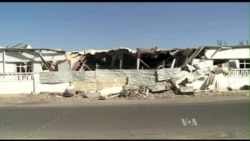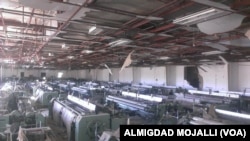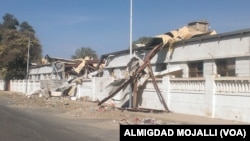In recent months, dozens of factories in Yemen's Sana'a province have halted operations after airstrikes destroyed equipment or buildings, according to former workers and managers.
More than a year of fighting between Houthi rebels and pro-government forces backed by a Saudi-led coalition has crushed Yemen's economy. In Sana'a province alone, thousands of people have lost their jobs and millions of dollars in revenue is gone. Yemen's economy was weak in pre-war times, but now it is in tatters.
The situation around the Yemeni capital has grown even worse since two major factories closed.
"This hall contains hundreds of machines worth millions of dollars," said Mohammad al-Sabri, pointing to rows of unused green textile machines still covered in rubble after a bombing in July.
Al-Sabri was the information officer for the factory, which employed more than 1,300 people. But now, like everyone else, he has no job.
The people who once purchased the textiles to make clothes also are suffering.
"The local economy has lost millions of dollars because this factory was targeted," al-Sabri said.
Growing desperation
On the streets of Sana'a, former factory workers and other unemployed men sit or squat on the sidewalks with their tools, often chewing the green leaves they call qat, a pastime that is a Yemeni tradition. The men are hoping to pick up a few days or a few hours of labor. But most days they just wait.
"I haven't worked for a month," says Abdo Ahmed Ali, holding a roller paintbrush to show potential passing employers his skill and equipment. "Sometimes I work for one day and then have nothing for a month."
Growing unemployment is not only crippling the economy, but also is driving more and more people to fight, according to Ghalib al-Sewary, who managed a ceramic factory in Sana'a that was bombed in late September.
The bombing left thousands of workers suddenly unemployed, and many have been living hand to mouth since then.
Working 'for whoever will pay'
"When there is no work, the people are forced to work for anyone, even if it's just for food," al-Sewary explains. "Nowadays people are waiting near the battlefronts. They want to eat and the fighters have money. Workers will now risk their lives for whoever will pay."
Yemen's war has killed more than 2,500 people this year alone, according to U.N. estimates. Even industries physically untouched by the violence are finding it harder and harder to operate, as prices soar and fuel remains scarce. Layoffs in industries across the public and private sectors are common.
"Because of the war and financial blockades against Yemen, many businesses and industries have fired everyone they could afford to lose," said Abdullah Mohammad, a former account manager. "I lost my job along with many others. Now I have to find a new one. I have a family."
International efforts
The United Nations says a cease-fire and peace talks will begin again next week. All previous efforts to negotiate have broken down, even when all major players took part. This time all the warring parties are planning to attend, officials say, and they will enforce a "press blackout" on the discussions.
At a summit in Riyadh this week, Gulf countries said even if the war ends, another international meeting is needed to address Yemen's economic crisis.
But in Sana'a, which is controlled by the Houthis, the main targets of Saudi-led airstrikes, many people have little faith that the countries accused of bombing them will return to rebuild.
"We didn't think they would attack us," said al-Sabri at the bombed-out textile factory. "But they started hitting the factory directly. First one rocket, then another and a third and then a fourth."








